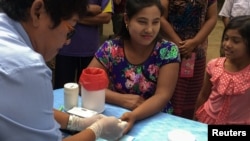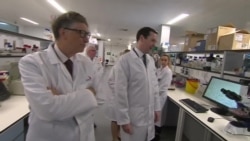The World Health Organization is joining a worldwide call to stop a resurgence of malaria that threatens much of the progress made over the past decade. To mark World Malaria Day, WHO is pushing for urgent action - and money - to get the global fight against this ancient scourge back on track.
For many years, World Malaria Day has been a cause for celebration, but not this year. World Health Organization data show that starting in 2016 progress has been at a standstill and hopes of ending the global epidemic by 2030 are slipping away.
Watch: Fears Grow Over Malaria Resurgence, London Summit Urges Global Action
Director of WHO's Global Malaria Program, Pedro Alonso, says some of the gains made in reducing the number of cases and deaths in countries across all regions of the world are being reversed.
"As a consequence, we now have about 260 million cases of malaria every year, in excess of 440,000 deaths every year…13:52…History has told us very clearly that when we stop making progress, it is not that we just stand still, but we go backwards and then malaria comes back, and comes back with a vengeance," Alonso said.
About 90 percent of all malaria cases and deaths occur in sub-Saharan Africa. Children under the age of five, pregnant women and patients with HIV-AIDS are most at risk.
Alonso says global political commitment must be renewed and donors and affected countries must increase the financial resources needed to successfully tackle malaria.
"And, we need new and improved tools to prevent, diagnose and treat malaria," Alonso said. "Our sense is that with the resources available today and with the tools we have today, we have seen the limit of what can be achieved."
The issue of malaria's resurgence came up on the sidelines of a Commonwealth summit in London this month, where Microsoft co-founder Bill Gates who has invested billions of dollars in fighting malaria pledged yet another one billion dollars to the effort.
WHO estimates $5.5 billion are needed each year to wage a successful global fight against malaria. However, only about half that amount has been pledged.
Vector control is the main way to prevent and reduce the spread of malaria. Alonso says better insecticides, better insecticide-treated mosquito nets as well as better drugs are essential in combating the disease.











